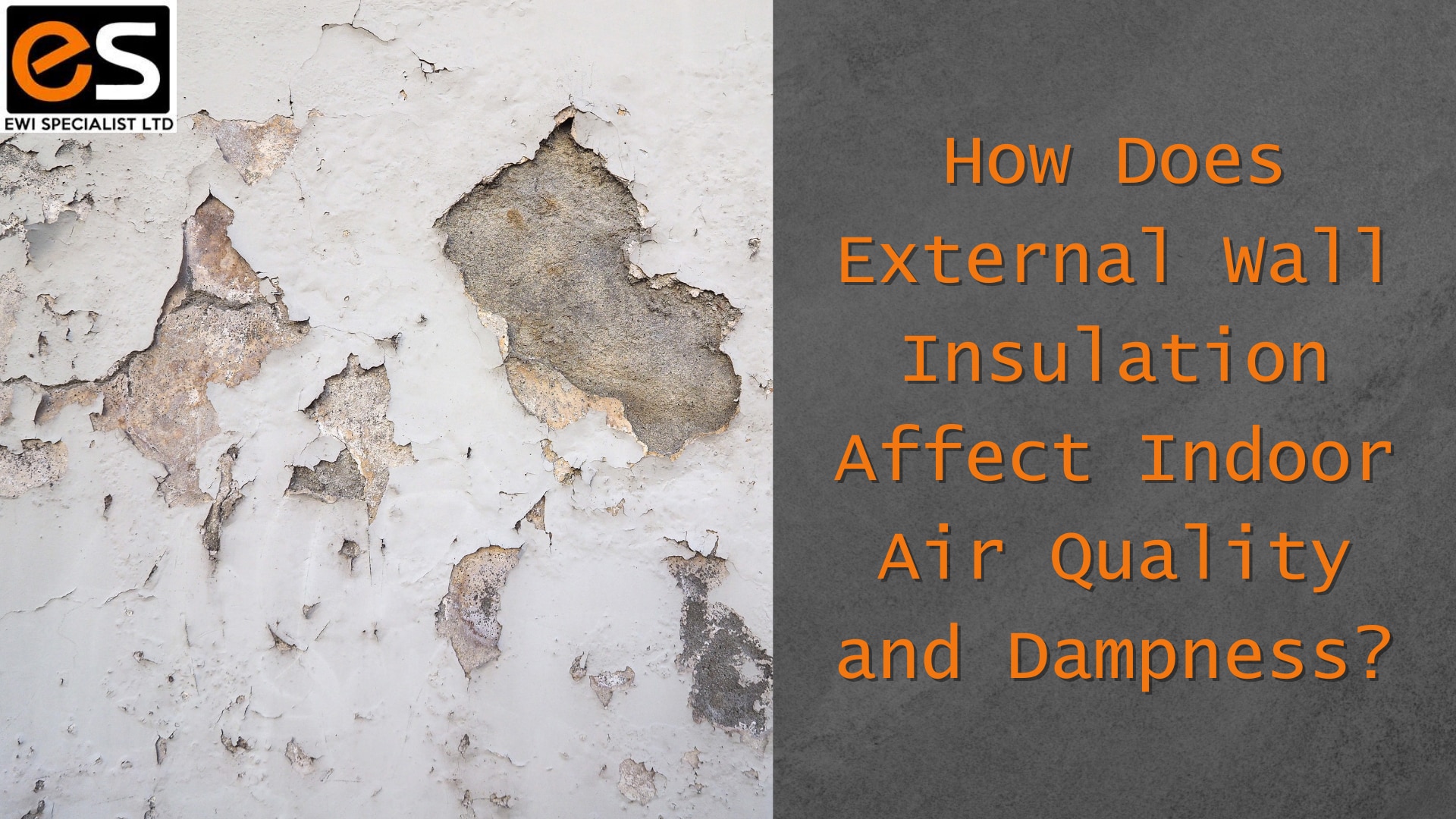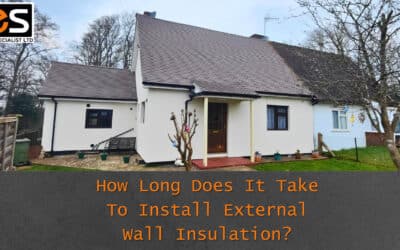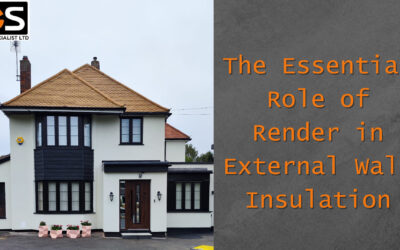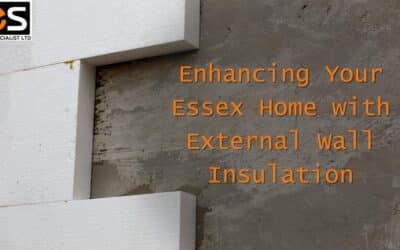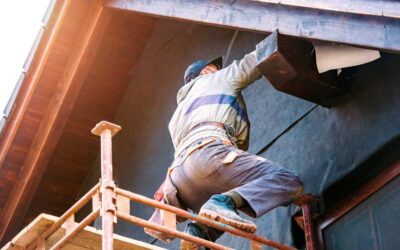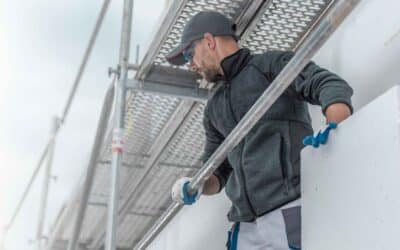External Wall Insulation and Indoor Air Quality. External Wall Insulation (EWI) is more than just an energy-saving measure; it’s a crucial factor in creating a comfortable and healthy living environment. At EWI Specialists, we understand the importance of this innovative solution in enhancing the thermal efficiency of your home, but equally vital is its impact on indoor air quality and dampness. With rising awareness about the significance of healthy living spaces, it’s essential to recognise how EWI can influence indoor air quality.
In this blog, we’ll explore the multifaceted role of EWI in not only conserving energy but also in ensuring that your home remains free from dampness-related issues like mould and mildew, which can affect air quality.
Join us as we delve into the nuances of EWI and its indispensable role in maintaining optimal indoor air quality and preventing dampness in homes, contributing to a safer, more comfortable living space.
External Wall Insulation Services in Essex
External Wall Insulation is an innovative solution increasingly adopted in Essex homes for its myriad benefits in home insulation. Essentially, EWI involves the application of an insulation layer to the exterior of a building, followed by a protective render. This process not only enhances the building’s thermal efficiency but also revitalizes its external appearance.
The installation of EWI is a meticulous process. It begins with the affixing of insulation boards to the external walls, typically using mechanical fixings and adhesive. These boards can be made from various insulation materials, including expanded polystyrene or mineral wool, depending on the property’s specific requirements.
Once the insulation layer is secured, it’s covered with a render. Rendering options for homes in Essex include acrylic and silicone, offering different finishes and colours. This render acts as a weatherproof barrier, protecting the insulation and the walls underneath.
Energy-efficient Insulation Essex
The primary functions of EWI are to reduce heat loss and improve energy efficiency. By wrapping the building in a thermal blanket, EWI significantly lowers the need for excessive heating, thereby reducing energy bills – a major benefit for homeowners in Essex.
External Wall Insulation and More Stable Indoor Temperature
Furthermore, EWI contributes to a more stable and comfortable indoor temperature year-round, enhancing living comfort. Additionally, EWI can improve sound insulation, a welcome feature in urban areas or places with high external noise levels.
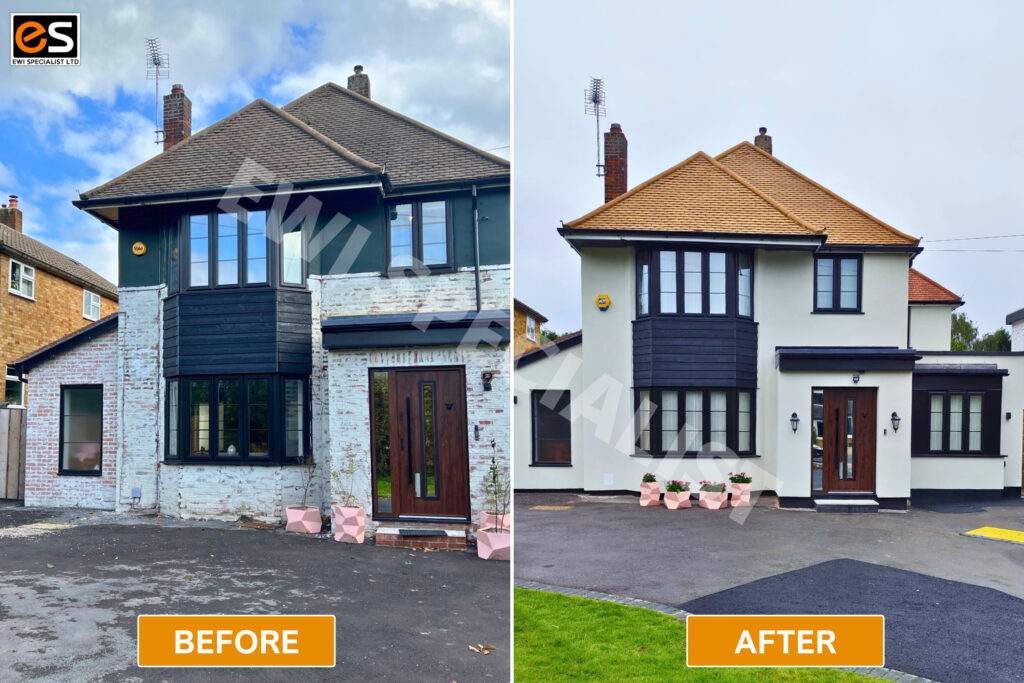
External Wall Insulation and Indoor Air Quality
External Wall Insulation plays a pivotal role in maintaining and improving indoor air quality, a crucial aspect often overlooked in discussions about home insulation. The relationship between External Wall Insulation and indoor air quality is multifaceted, involving both ventilation and moisture control.
When EWI is installed, it significantly reduces the amount of heat lost through walls. This reduced heat loss means less demand for heating systems, which, in turn, can lead to a decrease in the dry air circulated inside the house, often a byproduct of heating systems. Consequently, EWI can help maintain a more balanced and healthy indoor air environment.
However, there’s a common misconception about External Wall Insulation and Indoor Air Quality that EWI might impede natural ventilation. In reality, properly installed External Wall Insulation does not make a home ‘too airtight’. Modern EWI systems are designed to work in harmony with adequate ventilation strategies, ensuring that there’s a continuous exchange of air to prevent stale air build-up. This is where “EWI and ventilation” becomes a critical consideration – balancing insulation with proper ventilation systems to ensure a consistent supply of fresh air.
Moisture control is another significant aspect. By keeping the walls warmer, EWI reduces the likelihood of condensation, which can lead to damp and mould growth – both detrimental to indoor air quality. By controlling moisture, EWI contributes significantly to a healthier living environment.
EWI’s Role in Managing Dampness
Managing dampness within homes in Essex is a common concern for many property owners. By enhancing the thermal efficiency of walls, EWI reduces the likelihood of condensation – the primary cause of dampness inside buildings.
The effectiveness of External Wall Insulation in dampness prevention is significant. It maintains a warmer internal surface temperature of external walls, minimising the cold spots that often lead to condensation. When warm, moist air inside the home contacts these previously cold wall surfaces, it no longer cools down sufficiently to release moisture. This process effectively reduces the overall dampness within the home, creating a drier and healthier living environment.
Moreover, this reduction in dampness directly impacts the prevention of mould and mildew. These fungi thrive in moist conditions, so by controlling condensation through EWI, the risk of mould and mildew growth is substantially decreased. Thus, the EWI’s effectiveness not only lies in its insulation properties but also in its ability to foster healthier, mould-free living spaces, crucial for both the structural integrity of the property and the well-being of its occupants.
Choosing the Right EWI System
Selecting the right External Wall Insulation system is a crucial decision for homeowners in Essex, impacting both the effectiveness of the insulation and the overall aesthetics of the property. When choosing an EWI system, several factors need consideration, including the type of property, the local climate, and personal aesthetic preferences.
Key in selecting External Wall Insulation is understanding the different EWI materials available. Options range from polystyrene and mineral wool to wood fibre, each offering unique benefits in terms of thermal performance, breathability, and environmental impact. It’s essential to match these materials with your home’s specific needs to maximise the benefits of EWI.
Equally important is professional EWI installation. A well-installed EWI system can drastically improve a home’s thermal efficiency, but poor installation can lead to issues like thermal bridging or moisture problems. Professional installers can provide valuable advice and ensure that the system is installed correctly and safely.
Moreover, they can offer insights during the consultation phase to help you choose the best system for your home, considering all relevant factors for a tailored solution.
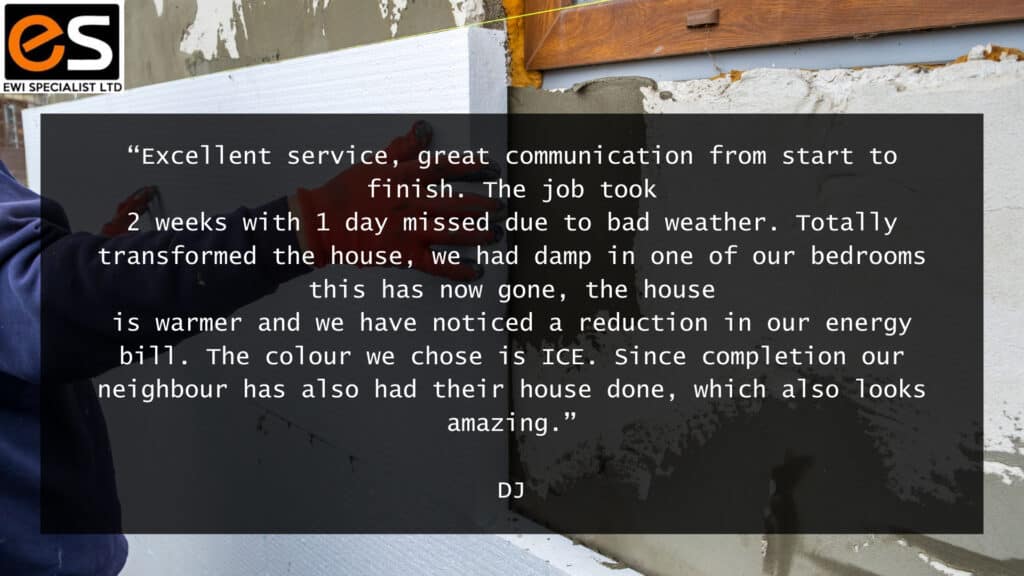
Overall, the correlation between External Wall Insulation and Indoor Air Quality is profound. EWI plays a crucial role in managing dampness, preventing mould and mildew, and ensuring a consistently warm and comfortable living space. For homeowners considering EWI, a consultation with an EWI Specialist is invaluable. Their expertise can guide you through the myriad options available and help tailor a solution that maximises the ‘improved home environment’ EWI offers.
Our team at EWI Specialist is dedicated to providing tailored solutions that meet your unique needs. With our expertise, we ensure that your investment in EWI is optimised for the best results.
If you’re considering upgrading your home with EWI, we’re here to help. Get in touch with us at EWI Specialist, an External Wall insulation installer in Essex for your free quote. Let us guide you towards a more comfortable, energy-efficient, and healthier home

